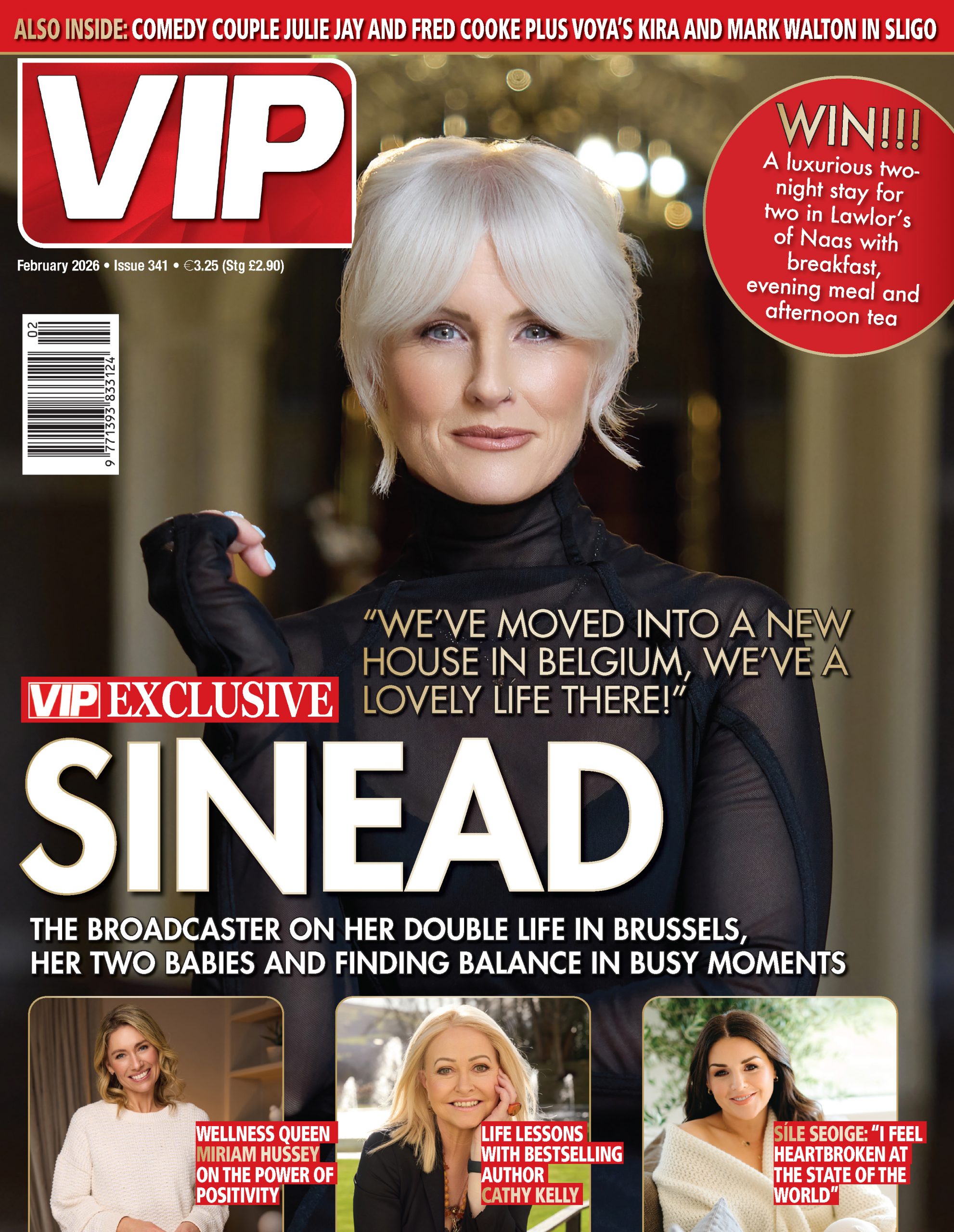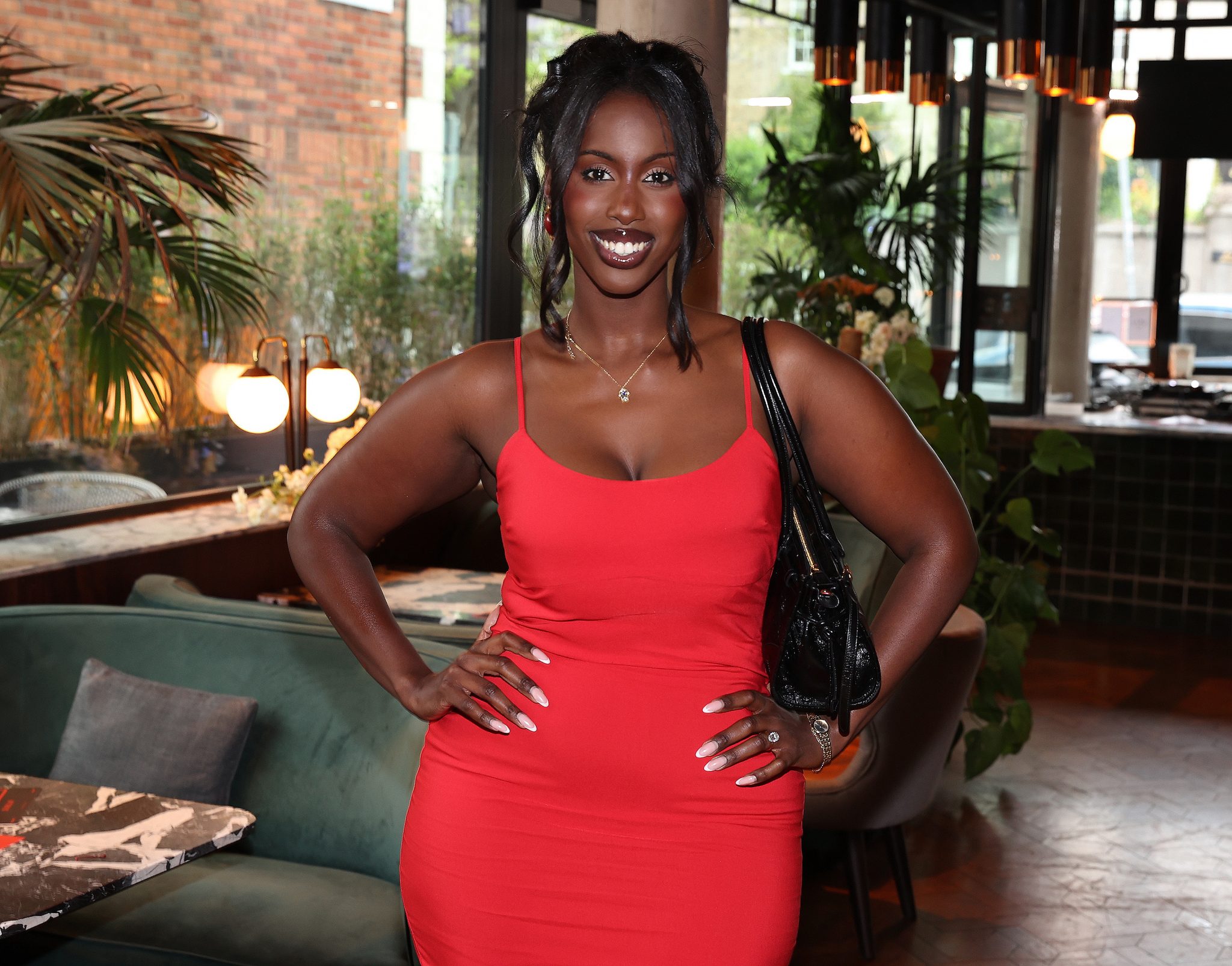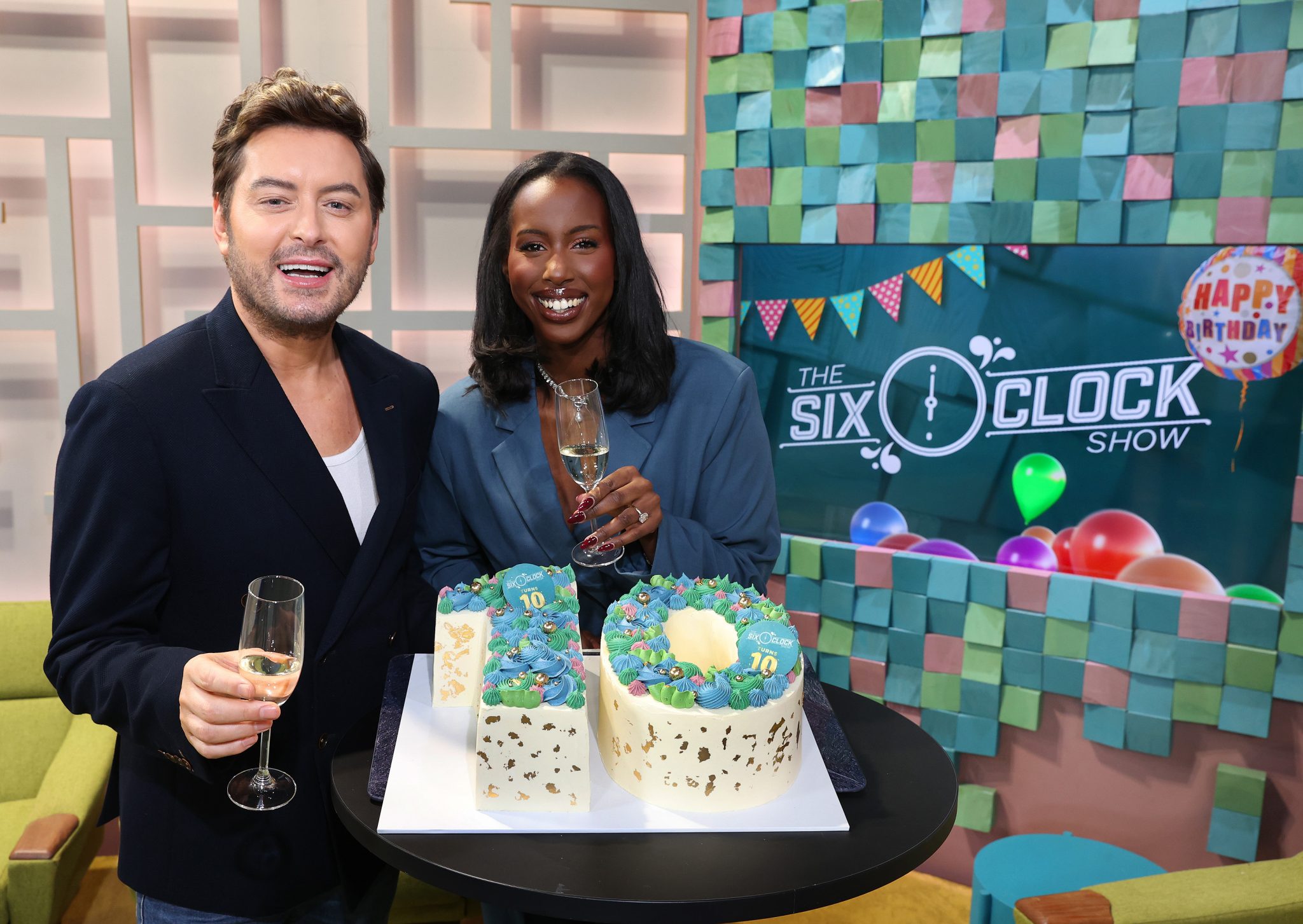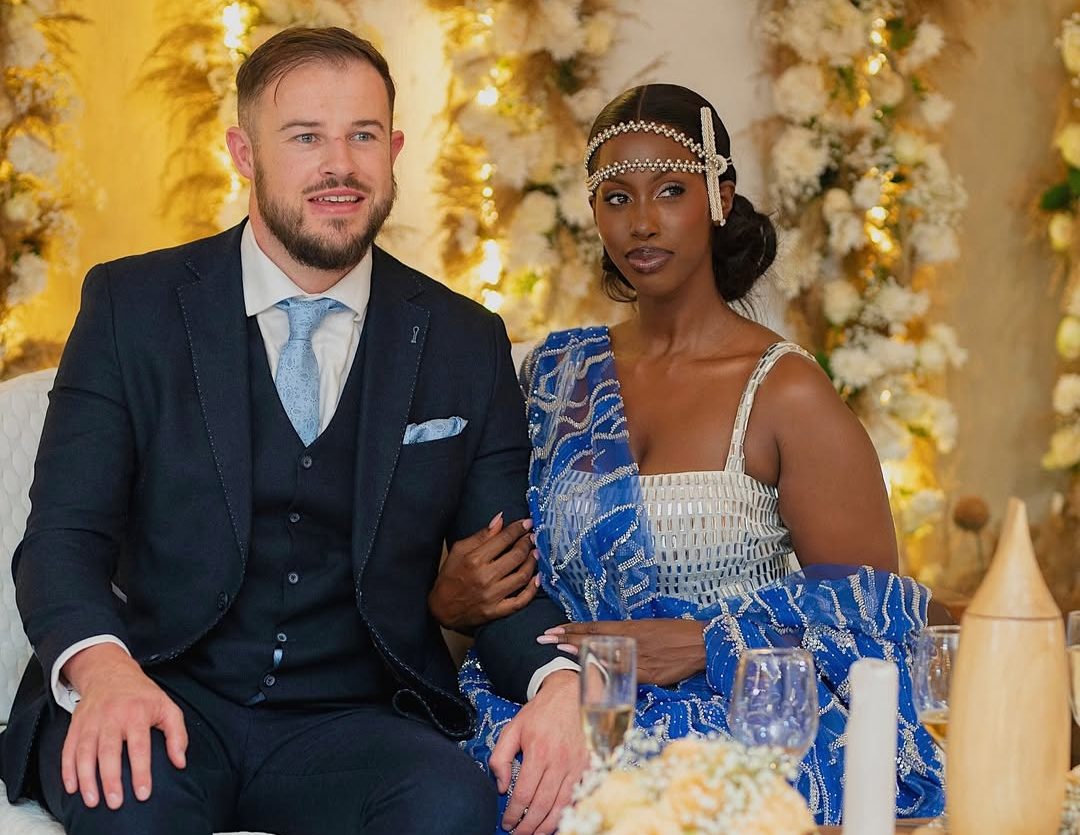
Butterflies are symbols of growth, of hope, of transformation and rebirth. They signify change, and new beginnings. Beauty, too. And just as the butterfly perched on Katja Mia’s dress evolved over time, so did she.
We joined the presenter at Malahide Castle and Gardens, with her mum Carinie, to celebrate growth; professionally, as she marks one year at the helm of The Six O’Clock Show, after leaving her finance career, and personally, as she delves into a new journey of self love and self care, too.
“That’s my girl, look at my gorgeous girl. Look at what she’s done, look at where she is now,” Carinie whispered, as her daughter stood in front of the camera.
Katja’s parents fled a war-torn Burundi in 1997, and lived in Germany – where the presenter was born – before moving here to Dublin, Ireland, to build a better life for their family, their four children.
“Everyone deserves the right to a safe home and a promising future, especially if you’re coming from a country with political conflict,” Katja muses. “My mam came here with no English. She learned it through working hard, through her kids and I can imagine it was very isolating for a woman in her 30s, in a brand new country, not speaking the language.”
“I know my parents now as Irish citizens. When I see people coming into Ireland these days, and think about how the far rights would treat my parents if they came here today, it breaks my heart,” she said. “They just wanted a better future for their kids, and there’s no crime in that. My mam is my inspiration, I want to do well for her. After all she did for us, I want to make her proud.” And there’s certainly no fear of that.
Here, we sit down with Katja to discuss family values, racism in Ireland, representation, personal evolution, faith and the importance of self belief in chasing dreams.

Katja, we enjoyed every minute of today, meeting your mam. You’ve a special bond!
Oh, we’re really, really close! We’re the same person; I’m the exact same as she was at my age. I really love this new era of our relationship. We’re just good friends. I can tell her everything and anything.
She’s such a grafter, a hard working woman. Does she inspire you, is she your role model?
Oh, she inspires me so much. The more I grow up, I hear stories about their way of adapting to a new culture, in a new country, and I really admire it. My mam didn’t take any English classes when she moved here. She had four kids and when we came to Dublin, made sure we spoke English at home as much as we could. My older siblings spoke German. I was born in Germany, that’s where they settled for two years after leaving Burundi, so my first words were in German. English was really encouraged in our house, even over our mother tongue because my mam wanted to learn it. She learned it through working hard, through her kids. I can imagine it was very isolating for a woman in her 30s, in a brand new country, not speaking the language.
Fleeing from war-torn Burundi, how old were you when you realised the significance and their bravery?
Mam and dad were always great at telling us stories, about the journey of how they got here. As kids, they’d tell us in a lighthearted way so it was almost like a bedtime story but it wasn’t until I was 21 or 22 when I started asking more in depth questions and realised the gravity of it all. It’s later in life, now as an adult, that I’m learning so much more and they’re opening up so much more, because we can have those adult conversations. I think that also made me a lot closer and helped me empathise with my mam. I admire her so much.
So you were born in Germany before moving here, to Dublin. How was your childhood?
Oh it was great! The family is tightknit, we’d always have dinner together, go to community parties and go to Mass on Sunday. We had great values and traditions. When I think of my childhood, I mainly think of playing outside. I ran around a lot, I fell, I broke my jaw. I had a lot of accidents. My parents were always dropping us to dance classes or stage school or tennis. They really wanted us to mix with everyone and have fun. I had a lovely childhood.
Are you and your siblings still as close now?
Yeah, I think my sister calls me about 17 times a day. It’s always Facetime, too. We always check in with one another, the whole lot of us. When we were growing up, if there was ever a fight, we’d have to make up before saying goodnight to each other, so even now if we’re bickering, we have to resolve it. It’s really fun, exploring adulthood together. My siblings are my best friends. I shared a bedroom with my two sisters until I was 17 or 18. We’re very close.

There were also dark, hard times growing up, as you suffered racial abuse. Having that bond with your siblings, did it help having someone you could confide in?
Absolutely, because I can be super honest with them and tell them anything. I can be really vulnerable with them. I’m a positive person and very optimistic 99 per cent of the time but that 1 per cent when I’m down, I can always go to them and they’ll always understand. They can almost read me and know what’s happening before I tell them.
And sadly, racism and hate is still prevalent. There were riots last year, some again recently in North Dublin over immigrant housing and only a few months ago you were ridiculed by a group of teenagers on the Luas…
I was obviously a baby when my parents came here and had to apply as asylum seekers in Ireland. I don’t remember much, but I have the photos and the stories, so I know the struggles. I know my parents now as Irish citizens and I view them with so much respect so when I see people coming into Ireland and think about how the far rights would treat my parents if they came here today, it breaks my heart. I can humanise that experience and I know how amazing and educated my parents are, how they just wanted a better future for their kids, and there’s no crime in that. I feel very deeply about that situation and it’s personal to me. I always like to think of myself as someone who’d jump up and defend any sort of immigrant, someone who’s black or brown, being bullied online or in real life.
Standing up to bullies makes a huge difference.
I’ll never forget one day when I was in town and there was a group of Indian students waiting at a bus stop and another group just started heckling at them, shouting ‘you’re stealing all of our jobs, get out of the country’ and nobody was saying anything. I think people need to have the courage to stand up and speak out, even if it’s intimidating. I went over and said something to the person who was shouting. Once I stepped in, another Irish man came over. I was really proud of being Irish and having Irish people around me, because once one person stood up, others did too and that’s what it’s all about. If I can do anything, it’s to encourage people to speak out against those bullies and fight for those people. The saddest thing is when you go through an experience – and I’ve been heckled on the Luas before – is that you can feel so isolated when nobody says anything, you can feel so lonely. I know people in their spirit want to speak out because they’ll come up to you afterwards but they should have stood up in the moment. I think if someone looks like the aggressor, if another white Irish person stands up and says, ‘What you’re doing is wrong’, they might actually listen to them, someone who looks like them, as opposed to someone who looks like me. That’s why it’s important to speak out and you’re seeing a lot more people do that now.
Everyone should have the freedom to be able to plan and work towards a safer, better future for themselves.
That’s it, everyone deserves the right to a safe home and a promising future, especially if you’re coming from a country with political conflict. Mam and dad were always working, so I think that inspired my work ethic. I work at what I love, whereas they were doing what they had to. When it came to Dancing with the Stars and simultaneously hosting The Six O’Clock Show, working seven days a week for a few months, I got through it realising I was having fun and doing something I loved. I’ve such a passion for broadcasting. Once I realised that my dream was in any way tangible, I went for it. I fought for it and stayed consistent. I’m so lucky to be doing a job that I love, that fuels me. Virgin Media has been around for 25 years now, I’m so proud to be a small part of that legacy.
You told us before you suffer with imposter syndrome, but has that eased now? You must be proud of yourself at the helm of The Six O’Clock Show?
Sometimes I still do have that imposter syndrome, maybe because it happened so quickly. The way the last two or three years transformed my entire life, I have to pinch myself. I don’t see as many black, female presenters, so it doesn’t feel real. When I’m going to work, sometimes I’m like, is this happening? Am I deserving? Am I doing a good job? I do my best and I always come prepared. I don’t want to waste anybody’s time and always want to be professional in work. The imposter syndrome works in my favour sometimes in that sense, because I don’t take anything for granted.

Almost a year in now, how has that been?
Yeah, we’re a year on air in November which is crazy to me. When myself and Brian started this, we totally shook it up, put our own spin on it. Our personalities are a bit out there, a bit extra. It suits the show. I describe it as organised chaos. We’re professional and do our job, but at the same time, we have fun.
Are you good pals? Are you excited to go into your second year together on a high?
Oh, so excited, I definitely want to ring in our second year on a high! I’ve worked with Deric Hartigan, Darren Kennedy, Zeinab and Fionnula J, they all fill in and we get on great. They’re amazing and it’s nice that they’re part of the extended family. When it comes to Brian and I though, we just have this great dynamic – we can finish each other’s sentences. When he needs help, I’ll jump in and when I need help, I’ll rub his wrist and he knows to jump in. We have each other’s back. There’s also just a bit of mischief whenever Brian’s in the building. We have a great time. We’ve built a lovely routine.
Being on telly, having an online presence, too, where do you draw the line and put up boundaries?
I think my relationship with Darragh, I don’t really show that as much as I used to, and my family. My sister said it to me one day, ‘Do you have any idea how many people view your story, you can’t share embarrassing clips of me.’ I understood straight away. I have boundaries around them now. I like to be honest and real though. I’ve shared about my hyperthyroidism, my endometriosis and weight loss journey. I suffer so badly with my endo and a lot of women relate to that. I don’t only share a highlight reel, I think it’s important to show the raw side too because it’s a community. I always try to be as open as I can but have some boundaries for the people I love.
On that topic, you’re on a new journey with your body now, after being diagnosed with an autoimmune disorder and endo. You’re looking after yourself, working out for your health, for the physical and mental benefits. How are you finding it, are you feeling any better?
I’m feeling so much better, but it’s a tough journey. I remember being 19 or 20, going on a diet and after two weeks, I’d have lost the weight but now I could be doing two or three months of work, and I’d only be down half a kilo. It’s a slow journey but I’m so dedicated, so committed. My hormones are all over the place. Working with an autoimmune disease, it puts a downer on everything but I’m working with a trainer and it’s a matter of perseverance. I’m on TV so I’m hyper aware of my image and that gets me down sometimes. When I look at myself, I criticise myself a lot. This can be despite what people say. People are so kind, will always lift me up and encourage me, but I think it’s my own thing, and partially down to growing up in an era where everyone you saw in magazines or on TV were a size zero so it got to my head a bit. I do criticise myself a lot about my weight but now I’m trying to focus on the health side. Ever since being diagnosed, I know it’s a health issue. I need to fix my insides first and then worry about everything else afterwards. That’s where I’m at now with that journey.
As you said earlier, representation matters, people are all different colours, shapes, sizes. There’s never just one type of person. Do you feel like a bit of a role model now?
I’m not perfect and I know I’ll make mistakes, but at the same time, it is great when I have other brown and black women reach out, and women who are curvier with full figures who’ll message to say they love what I’m wearing, that they have the confidence to wear the same dress because they’ve hips and a bum like me. When I get those messages, I just smile. I love it. I just want to keep doing my best and I’m happy to be a role model in some way, yeah.

Tell us Katja, when are you at your most confident, at your happiest?
Oh I’m happiest when watching the Real Housewives on my couch, with my dinner on my lap. My hair up, makeup off and skincare on, in a comfy tracksuit. That’s my happy place and I could stay there forever. I try to watch one episode per evening or have an ultimate lazy evening on a Sunday after the house has been cleaned. I also love spending time with my family, I still go down to my mam’s house and I’d stay for hours. Whenever I say I’m popping down, Darragh will laugh and say see you tonight, because we just sit there all day
having a goss, a chit-chat with my sisters.
You have a lot of faith too, don’t you? Meditation, manifestation, trusting the universe but also in the spiritual sense as well, in prayer.
Yes, I’m a big believer in journaling, writing down how you feel and sticking it on paper. It’s a huge thing for me. It halves the problem. It’s a bit more tangible when you can see it, you can break it down into small chunks and find a way to feel better. I always love lighting my favourite candle, manifesting and thinking about three goals I want to achieve. I know everyone’s not into this, but I also have the Bible app on my phone. I don’t really go to church, but I love listening to a prayer verse, it really calms me down. Both of my grandmothers were very religious so I find a bit of comfort in that. Whenever I have a big job or audition, my dad says a rosary for me. I’m a big believer in gratitude.
Your twenties have been such a pivotal decade, so much growth, complete change and overhaul in life and career! What do you think the next decade will hold?
I’m starting to surprise myself every year, and my expectations are set quite high. I’ve reached one of my massive goals by doing The Six O’Clock Show. I presented Uprising, a music show, earlier this year and would love to do more documentary style pieces. Hopefully that’ll be what I work on, maybe it’ll be next in my future.
Interview: Michelle Dardis
Photography: Evan Doherty
Styling: Zeda The Architect, assisted by Eoin Gavin and Aoife McGuigan
Hair: Tracy Hlukaku, @traychic_designs
Makeup: Annie Masudi, @contoursofcongo, using Charlotte Tilbury
This shoot took place in Malahide Castle and Gardens. You too can visit Dublin’s most loved medieval castle, see the splendour of Lord Milo Talbot’s walled botanical garden, the exotic Butterfly House, and the wooded West Lawn, discover perfect picnic stops, lush grassland and lose yourself down the winding pathways of the Walled Garden. For more visit www.malahidecastleandgardens.ie
Tune into Katja on The Six O’Clock Show, weeknights on Virgin Media. Follow her on Instagram too, @katja_miaa








